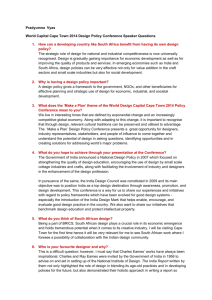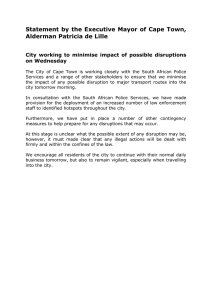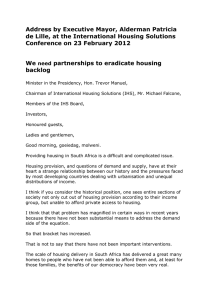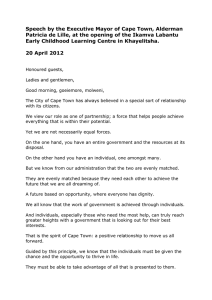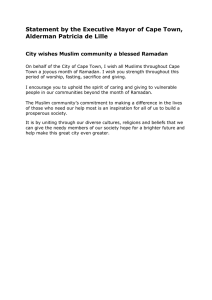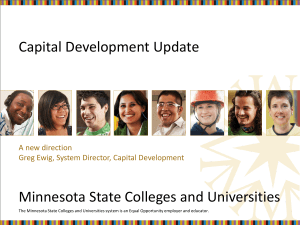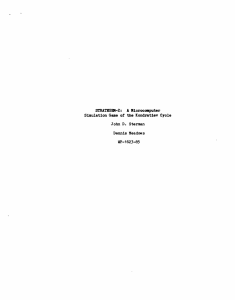Speech by Executive Mayor Alderman Patricia de Lille,
advertisement
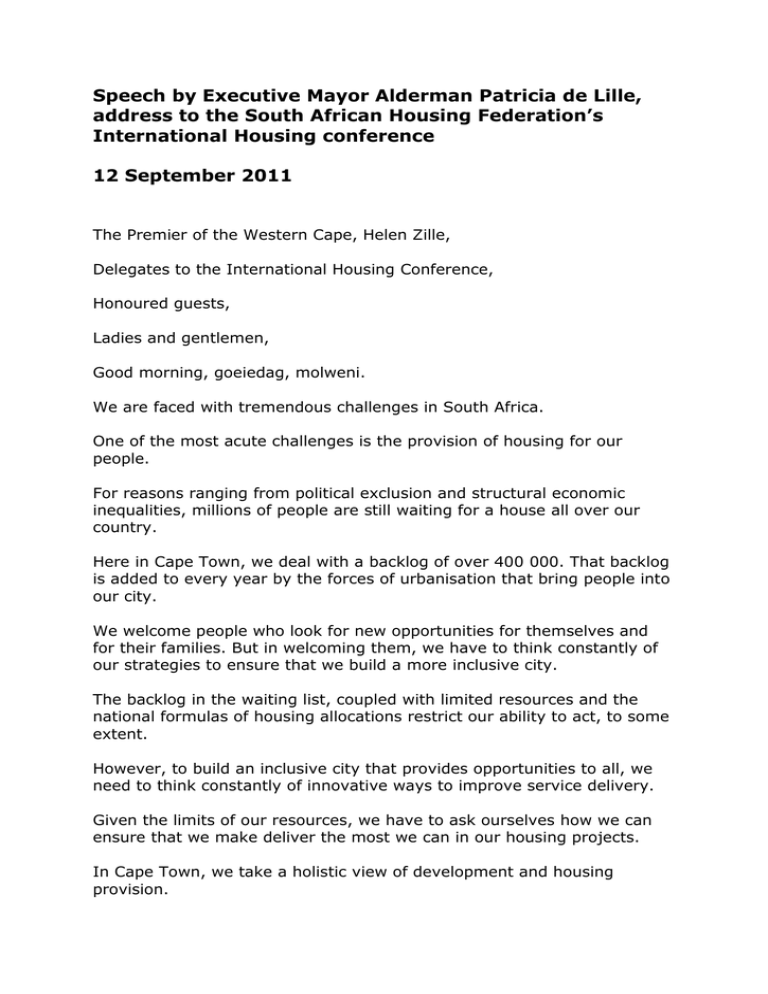
Speech by Executive Mayor Alderman Patricia de Lille, address to the South African Housing Federation’s International Housing conference 12 September 2011 The Premier of the Western Cape, Helen Zille, Delegates to the International Housing Conference, Honoured guests, Ladies and gentlemen, Good morning, goeiedag, molweni. We are faced with tremendous challenges in South Africa. One of the most acute challenges is the provision of housing for our people. For reasons ranging from political exclusion and structural economic inequalities, millions of people are still waiting for a house all over our country. Here in Cape Town, we deal with a backlog of over 400 000. That backlog is added to every year by the forces of urbanisation that bring people into our city. We welcome people who look for new opportunities for themselves and for their families. But in welcoming them, we have to think constantly of our strategies to ensure that we build a more inclusive city. The backlog in the waiting list, coupled with limited resources and the national formulas of housing allocations restrict our ability to act, to some extent. However, to build an inclusive city that provides opportunities to all, we need to think constantly of innovative ways to improve service delivery. Given the limits of our resources, we have to ask ourselves how we can ensure that we make deliver the most we can in our housing projects. In Cape Town, we take a holistic view of development and housing provision. For instance, we know that most of our people still have years to wait for a new home. Many of those people live in backyarder communities. We do not feel they should wait with nothing. That is why we have undertaken a new strategy to provide services to backyarders. The first part is conducting engineering surveys to assess the scale of services needed in a particular community. The second part is then providing some of the basic infrastructure that can improve people’s lives. This includes structures containing a toilet and a sink, linked to water mains, with the whole structure externally connected to electricity power sources. This project is being undertaking in certain pilot sites at the moment. However, we believe that it will provide a model in the South African context for doing more to provide services as part of a broader strategy dealing with the housing backlog. This plan is a model of innovative thinking in government in helping us fulfil our mandate. But we must constantly look for other ways of being innovative in creating dynamic policies of delivery. Part of that thinking must apply to the actual houses we build as part of our broader housing strategy. We know that there have been numerous sea-changes in how we think about housing provision in the past two decades. We started at a point of trying to build as many identical houses as possible in certain areas. However, we quickly encountered problems that stemmed from the fact that these housing developments were not linked to broader communities and did not themselves foster a sense of community. We have come to realise that housing is about building sustainable communities that link people together and to the rest of the city in which they live. This is certainly the approach we follow in Cape Town. We have also shifted our thinking to take greater consideration of our environment and building sustainable communities. In Cape Town, we know that we have to build communities that fit into our broader environment and add to our rich natural diversity, not detract from it. But thinking about these matters evolves, as any policy that seeks to be dynamic vehicle of delivery should. That is why gatherings such as these are so important. They provide a forum for stakeholders from the private and public sectors to come together with government and with international actors. Such multi-party collaboration and engagement ensures that we are all following the best national and international practice. It provides the space for government to meet the best private sector thinking and for the two to grow from each other. It also ensures that we have the space to talk to each other and overcome common problems. Moreover, we have the space to put our minds together and come up with new solutions that can help us improve our performance. I welcome all of you to our city and I would like to thank the Southern African Housing Foundation for convening this International Housing Conference. As we seek to build a more inclusive society that gives our people opportunities, I hope you have constructive and informative engagements. In the end, such engagements will impact delivery on the ground. And by improving delivery, we help improve people’s lives.

